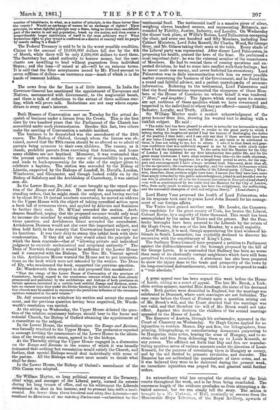Both Houses of Convocation met on Tuesday for the actual
de- spatch of business under a license from the Crown. This is the first time for two hundred years that the Parliament of the Church has assembled under such circumstances. Besides this fact, two others ' make the meeting of Convocation a notable incident.
The business to be despatched was the amendment of the 29th -canon. The Bishop of Oxford, through whom the license was ob- tained, moved thatthe-29th canon should be so altered as to admit of parents being sponsors to their DOM children. The canons, as it stands, prohibits parents from exercising that function, and hence many children are not baptized. Moreover, it was contended that the present system -weakens -the sense of responsibility in parents, and leads to hack-sponsorship for the sake of the supper given to celebrate a baptism. The motion was seconded by the Bishop of Lincoln, supported by the Bishops of .Landaff, St. David's,.London, Winchester, and Gloucester, and though looked coldly on by the Bishop of Salisburyand the Archbishop of Canterbury, it was carried 4:814. dia.
In the Lower House, Dr. Jell at once brought up the vexed ques- tion of the Essays and Reviews. -He moved the suspension of the standinr• orders, that lie might reach the subjeet,end having carried it by about 30 to 18 (actual numbers uncertain), he moved an r' address to the Upper House with the object of taking synodical action upon hook full of erroneous views, and applied by Atheists and Socinians to further their ends. Dr. M'Caul seconded the motion. Arch- -deacon Sandford, urging that the proposed measure -would only tend . to increase the mischief by exciting public curiosity, moved the pre- vious question, and Archdeacon Grant seconded the amendment. Archdeacon Denison would not slur over this important subject, and 'thus hold forth to-the country that Convocation feared to carry out its functions. It was their duty to-stamp this infidel book with their -condemnation. If -they did not they would admit the principle for . which the book contends—that of "allowing private and individual judgment to override ecclesiastical and scriptural authority." The Dean of Norwich thought it would be sufficient if the Lower House said it concurred-with the Bishops. The Rev. Mr. Vincent agreed in this. Archdeacon Moore warned the House not to put interpreta- tions on the book which were not intended by the writers. The Dean of Ely, who condemned the book, supported the previous question. Dr. Wordsworth then stepped in and proposed this amendment : "That the clergy of the Lower House of Convocation of the province of Canterbury, having regard to the unanimous censure which has been already pronounced and published by the archbishops and bishops of both pmvinces on certain opinions contained in a certain book entitled Essays and Reviews, enter- tain an earnest hope that under the Divine blessing the faithful zeal of the Chris- tian church may be enabled to counteract the pernicious influence of the erroneous opinions contained in the said volume."
Dr. Jelf consented to withdraw his motion and accept the amend- inent, and the previous question having been negatived, Dr. Words- worth's resolution was carried.
At the sitting on Wednesday., the Upper House debated the ques- tion of the-relation missionary bishops should bear -to the home and colonial Church, the Bishop of Oxford obtaining the appointment of a committee on the subject.
In the Lower House, the resolution upon the Essays and _Reviews, was formally remitted to the Upper House. The_proluentor reported • a message inviting the concurrence of the Lower House in the alters- .tion of the twenty-ninth eanou, agreed to by the bishops.
At the Thursday sitting the Upper House engaged in a discussion on the Essays and Reviews in the course of which it was broadly intimated that nothing but recantation would satisfy the Church, and -further, that special Bishops would deal individually with some of the parties. All the Bishops will meet next month to decide what shall be done.
In the Lower House, the Bishop of Oxford's amendment of the 29th Canon was adopted.






























 Previous page
Previous page